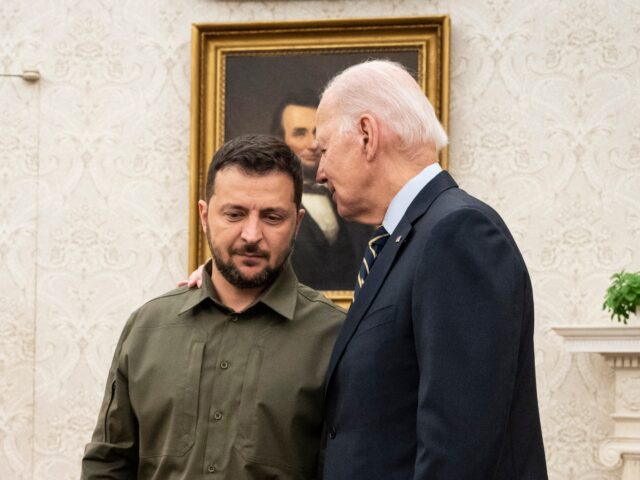President Joe Biden reportedly told Volodymyr Zelensky during a White House meeting this week that the U.S. will send Ukraine long-range ATACMS missiles, amid growing questions about the continued funding of the war.
In addition to the $325 million military aid package, Biden reportedly pledged during a meeting with Zelensky on Thursday to supply the war-torn country with ATACMS missiles. The long-range missiles, which can hit targets up to 190 miles away, would represent a significant upgrade for the Ukrainian forces, which currently only have missiles capable of striking at a range of around 150 miles.
Kyiv has long lobbied Washington for the Pentagon to supply ATACMS, however, the Biden administration has previously been hesitant to make the move for fear of escalating the war with Russia. According to a report from the Wall Street Journal citing U.S. officials, the Ukrainians have provided assurances that they would not use the long-range missiles to strike Russian territory.
The Defense Department was also reportedly concerned that supplying Kyiv with ATACMS could dangerously reduce U.S. supplies of the missiles, potentially putting the military at a disadvantage if another conflict breaks out in Asia or the Middle East.
However, according to the report, such concerns were allayed by the Biden administration’s decision to allow cluster munitions to be sent to Ukraine, thereby expanding the available ATACMS to send to the country given that some are equipped with cluster fixtures. The weapons type, which explodes mid-air in order to rain down on a large area, has been banned by over 100 countries given their high rate of failure and propensity to explode at a later time, putting civilians at risk.
So far, the White House and the Pentagon have not confirmed the reports of Biden promising Zelensky ATACMS missiles. It is also unclear from the reports when the U.S. would begin supplying the missiles if confirmed.
National Security Adviser Jake Sullivan said the administration was “not taking it off the table in the future,” adding that President Biden is “constantly speaking both to his own military and to his counterparts in Europe and to the Ukrainians themselves, about what is needed on the battlefield at any given phase of the war”.
Sullivan added that the White House will “ensure that we are able to provide for our own deferred deterrence and defence needs”.
The reports come amid a growing sense that the much anticipated Ukrainian counteroffensive against the Russians will likely not break through before winter conditions make the movement of troops and heavy weaponry difficult. Even President Zelensky admitted this week that “nobody knows” if there will be a significant breakthrough against the heavily entrenched Russian lines this year, although he said that he believes Ukraine “will have more success” next year.
Yet, it remains to be seen how much longer the West will continue to subsidise Kyiv’s war effort, with Warsaw announcing this week that Poland will no longer be supplying weapons to Ukraine amid growing tensions over trade after the EU lifted a ban on Ukrainian grain imports, and Poland, Slovakia, and Hungary announcing they will enact their own bans to protect their domestic markets.
There is also growing opposition to more funding for the proxy war in Washington, with nearly two dozen Republican lawmakers, led by Sen. J.D. Vance (R-OH) and Rep. Chip Roy (R-TX), coming out on Thursday to announce their intention to vote against more money for Ukraine. The Biden administration is currently demanding that Congress provide an additional $24 billion in aid to the country, on top of the $113 billion approved by lawmakers last year.

COMMENTS
Please let us know if you're having issues with commenting.